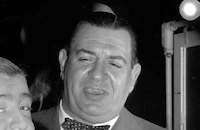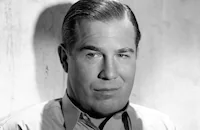The Chief

Brief Synopsis
Cast & Crew
Charles F. Riesner
Ed Wynn
Charles "chic" Sale
Dorothy Mackaill
William Boyd
Effie Ellsler
Film Details
Technical Specs

Synopsis
On the Fourth of July, in the Bowery of the 1890's, bumbler Henry Summers attends an outdoor ceremony at which a water-spouting statue of his fire chief father, who died during a heroic fire rescue, is to be unveiled. After he accidentally causes the statue to drench everyone at the ceremony, Henry is fired from his shipping job at Al Morgan's department store, but is made honorary fire chief by the Bowery fire department. During the induction ceremony, a fire breaks out, and Henry is dragged to the scene. Although terrified, Henry finds himself inside a burning building and, through an accident, rescues an unconscious woman from the flames. Henry is declared a hero by the local newspapers and is courted by Morgan, who offers him a new job as the manager of his hat department. Soon after Henry's return to the store, Morgan schemes with racketeer Danny O'Rourke and dancer Dixie Dean to talk Henry into running against Clayton, the crooked alderman of the Bowery. Before Morgan proposes his plan to Henry, however, Clayton offers the clerk a higher paying job as well as an opportunity to expand his fledgling orchestra. Flattered by Clayton's offer, Henry tells Morgan he is quitting and refuses to consider his campaign idea. Dixie eventually persuades the adoring Henry to run against Clayton by telling him that Clayton once had struck her. Before Henry officially announces his candidacy at a banquet, however, Clayton and his gang start a brawl in the banquet room and frighten him into withdrawing from the race. Once again, Dixie changes Henry's mind by telling him that if Clayton is re-elected, he will neglect his civic duties and possibly cause her death in a fire. Thus inspired, Henry declares his candidacy and brings a circus to town to kick off his campaign. While Henry is impressing his potential voters by wrestling a circus bear, his doting mother Ma is kidnapped by Clayton's men. Henry then is notified through an anonymous telephone call that if he wants to see his mother alive, he must pull out of the race. To save Ma, Henry prepares to meet the kidnappers' demands and, after a reformed Dixie reveals Morgan's scheme to him, telephones the newspaper to report his withdrawal. The reporters, however, are suspicious of Henry's call and fail to print the story in their next edition. Before Clayton and his men make good on their threats, Henry decides to act crazy in order to turn the voters against him and, wearing a lampshade on his head, runs screaming through the streets. During Henry's run, Clayton is arrested for the kidnapping, and Ma is saved. Henry then appears in a radio studio summing up the "third act" of his fire chief "opera." After revealing that Ma, Dixie and he lived happily ever after, Henry says goodbye to his appreciative radio listeners.

Director

Charles F. Riesner
Cast
Ed Wynn

Charles "chic" Sale

Dorothy Mackaill

William Boyd
Effie Ellsler

C. Henry Gordon

Mickey Rooney

Bradley Page
Purnell B. Pratt

George Givot

Tom Wilson

Nat Pendleton
Bob Perry
Jackie Searl
Graham Mcnamee
Crew
William Brockway
Arthur Caesar
William S. Gray
Robert E. Hopkins
Edward F. Paul
Harry Rapf
Stanwood Rogers
Sandy Roth
Douglas Shearer
Dolly Tree
Edwin B. Willis

Film Details
Technical Specs

Articles
The Chief
The quavering-voiced, google-eyed Wynn plays Henry Summers, the bumbling son of a heroic fire chief, who is made honorary chief in his father's honor. Dragged against his will to an actual fire, Summers's clumsiness is mistaken for bravery and he becomes a popular figure in New York's Bowery district (in the Gay Nineties). Summers is fired from his day job (for incompetence), until his boss, Al Morgan (Purnell Pratt) realizes he could profit from Summers's political pull. With a little feminine persuasion from a worldly but good-hearted dame (Dorothy Mackaill), Summers agrees to run for alderman against the well-connected Paul Clayton (C. Henry Gordon). To keep Summers from being a shoe-in, Clayton kidnaps Summers's mother (Effie Ellsler) and blackmails the son to throw the election. Unable to withdraw from the election so late in the race, Summers decides to fake insanity and parade like a madman through the streets of New York -- not realizing that his mother has won the hearts of her captors with home-made biscuits and material affection.
An hour into the film, just as it reaches its climax, there is an abrupt shift of format and setting, and The Chief becomes a radio show, with Wynn performing behind the mike, along with straight-man Graham McNamee. This was clearly a sop to Wynn's listenership, a five-minute bonus feature for those hoping for a glimpse of the radio star in his natural habitat (the Times called it "a somewhat desperate attempt to corral the comedian's radio public"). Wynn performed his radio show in much the same way as it appears in The Chief, opening with a hand-cranked siren, with a live studio audience, and back-up orchestra. The degree to which MGM was cashing in on Wynn's popularity is obvious in the film's title itself, as the comedian's radio show was called The Fire Chief (sponsored by Texaco).
The Times's greatest complaint about The Chief was that, instead of letting Wynn perform his shtick in his usual way, the filmmakers forced him into slapstick situations that didn't jibe with his direct-address comedy stylings. "In a perfect world there would be unmentionable penalties for gag-men who weighted him down with the bewhiskered slapstick that has found its way into The Chief."
Born in Philadelphia as Isaiah Edwin Leopold, the comedian began earning a reputation in vaudeville in the early 1910s, formulating a stage name from his middle name (Edwin = Ed Wynn). By the mid-1910s, he had graduated to the high-profile Broadway extravaganzas of Florenz Ziegfeld. Wynn's only silent movie credit was the Paramount feature Rubber Heels, opposite Chester Conklin and Thelma Todd, in 1927. The stage and radio suited him better, since his flustered, warbling voice was such a crucial component of his persona.
The Chief's director, Charles Reisner, had helmed Buster Keaton's last independent feature, Steamboat Bill, Jr. (1928) and it's apparent that the studio was attempting to make Wynn's radio/stage comedy more cinematic. It seems the experiment was not considered a success, and Wynn didn't truly return to the big screen until providing the voice of the Mad Hatter in Disney's Alice in Wonderland (1951). By that time, he had fully trademarked his shtick and conquered television with The Ed Wynn Show (1949-50).
Comfortable in his success, Wynn later took on straight dramatic roles, in the original production of Requiem for a Heavyweight on TV's Playhouse 90 (1956).
Wynn's son, Keenan (1916-1986), followed his father into show business, and is probably best remembered as Colonel "Bat" Guano in Stanley Kubrick's Dr. Strangelove (1964).
The Chief is notable for having an early (albeit brief) appearance by rising star Mickey Rooney. He has no lines, and appears in two shots in the opening sequence, as a mischievous boy who tosses firecrackers at the feet of the near-hysterical Summers. Though the role is miniscule, Rooney was billed prominently, perhaps a sign that MGM had big plans for the thirteen-year-old lad. The Chief was made while Rooney was appearing in a long run of "Mickey McGuire" comedies, independent short films based on a character in Fontaine Fox's "Toonerville Folks" comic strip. Rooney's experience on the set of The Chief must not have been consequential, as he failed to mention the production in his 1991 memoir Life Is Too Short.
Director: Charles Reisner
Producer: Harry Rapf
Screenplay: Arthur Caesar and Robert E. Hopkins
Cinematography: Edward Paul
Production Design: Stan Rogers
Cast: Ed Wynn (Henry Summers), Dorothy Mackaill (Dixie Dean), Effie Ellsler (Ma Summers), C. Henry Gordon (Paul Clayton), Purnell Pratt (Al Morgan), Nat Pendleton (Big Mike), Charles "Chic" Sale (Uncle Joe), William "Stage" Boyd (Danny O'Rourke), George Givot (Clothier), Mickey Rooney (Willie), Graham McNamee (himself).
BW-66m.
by Bret Wood

The Chief
Quotes
Trivia
Ed Wynn basically recreated his popular radio character "The Fire Chief" in this movie. The original opening of the movie had Wynn describing a three-act opera on his radio show, but that sequence was cut from the final release print. But the ending, in which he describes on his radio show the fate of the characters in the opera, is in the movie.
Notes
The working title of this film was The Fire Chief. Ed Wynn, whose above-the-title credit includes the descriptive phrase "The Perfect Fool," recreated his popular radio character, "The Fire Chief," in the film. The Fire Chief program, which was sponsored by Texaco Oil, was first broadcast on April 28, 1932 on the NBC broadcasting network. Graham McNamee, who appears in the film, was the show's band leader and announcer. According to the Film Daily review, the film opens with Wynn introducing his "three-act opera" in a radio broadcast. This opening apparently was cut from the general release prints. The Variety review, which describes an early December 1933 New York screening, lists the film's running time as 80 minutes, while a Daily Variety September 1933 review gives the length as 89 minutes, suggesting that at least nine minutes May have been cut from the story. An August 1933 Hollywood Reporter news item announced that Jack Cummings was to supervise the production, but his participation in the final film has not been confirmed. According to an early September 1933 Daily Variety news item, Edna May Oliver was to replace Jobyna Howland in a role, but neither actress appears in the final film, and it is not known to which role the actresses were assigned.














